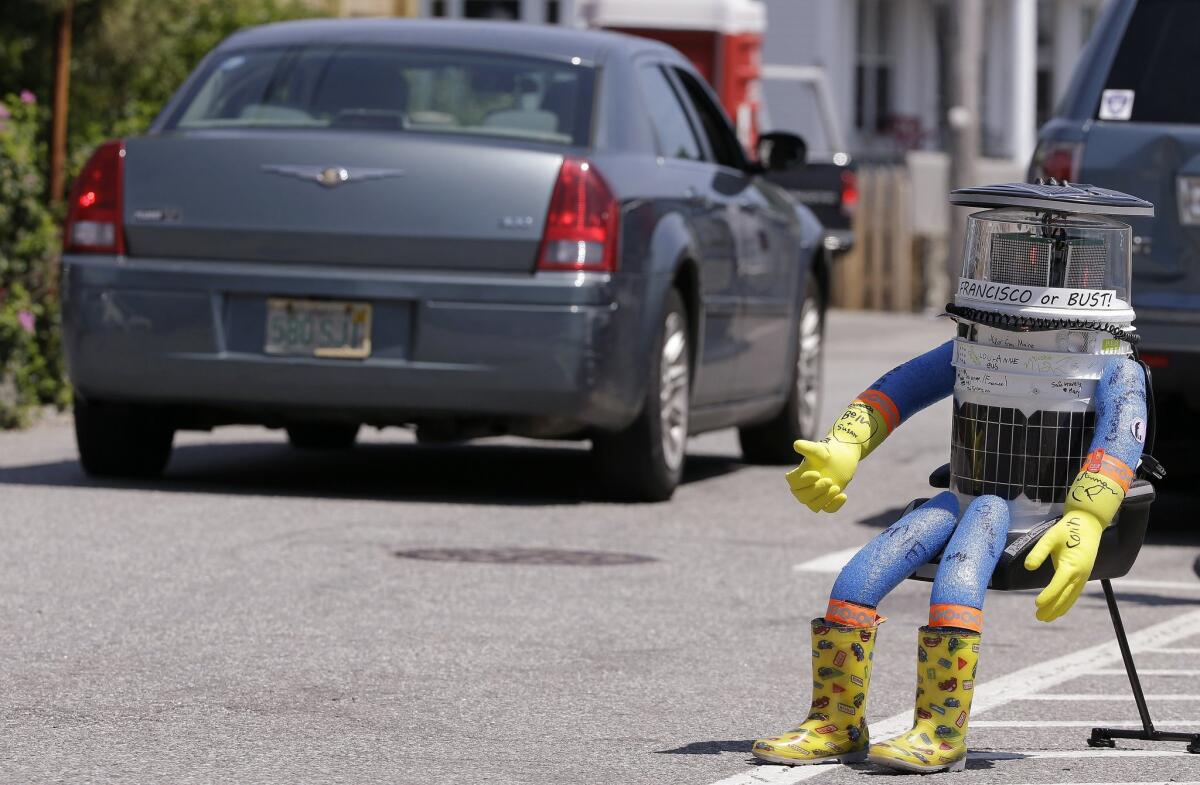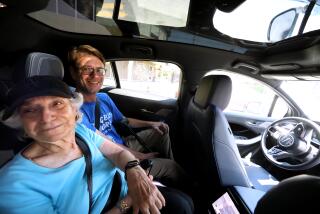Five rules you need to know to stay safe while hitchhiking (and avoid Hitchbot’s fate)

Hitchbot, a hitchhiking robot, is seen in Marblehead, Mass., on July 17. This week, as it continued its journey, the robot was damaged beyond repair in Philadelphia.
- Share via
If you’re a fearless hitchhiker, listen up: Hitchbot is dead.
After successfully navigating the roads in Canada, Germany and the Netherlands, the roaming robot was vandalized beyond repair this week in Philadelphia, the city of Apparently Not So Brotherly Love.
“Oh dear, my body was damaged, but I live on back home and with all my friends. I guess sometimes bad things happen to good robots!” Hitchbot “wrote” in a post in which it describes itself as being from Port Credit, Ontario. Its “guardians,” Hitchbot says, are David Smith of McMaster University in Hamilton and Frauke Zeller of Ryerson University in Toronto, both in Ontario.
Hitchbot’s demise may raise some concerns about thumbing in general. Many of us who travel have done it, and if you did school time abroad, you probably hitched a ride sometime.
I did both in my youth and was never the worse for wear, except maybe the time I was hitchhiking to the airport in Wichita, Kansas, in a snowstorm ... but I blame that on the storm. Today, I’d probably just call Uber.
But hitchhiking is, at its core, the ultimate rideshare, and it’s usually free.
Although more common in Europe, hitchhiking is often frowned upon in the U.S. because of fears about attacks that result in injury or death. Statistics that deal specifically with hitchhiking safety are difficult to come by, but Wand’ly magazine, citing Federal Bureau of Investigation statistics, notes that in 40 years beginning in 1979, there were “675 reported victims of sexual assault and murder along Interstate Highways.”
This, the article by Nathan Swartz says, amounts to a .0000089% chance of being raped or killed and then being left on the side of an interstate highway.
“You’re far more likely to accidentally shoot yourself or fall down and die than to be killed hitchhiking,” it notes, although, again, those statistics are based on interstate highway travel.
We should note: We are not telling you to hitchhike. But if you do, let “safety first” be your motto.
Here is intel from blogs to help you begin thinking about safety. To learn more, read these linked posts:
1) Don’t hitchhike at night, says Hitchwiki. Besides visibility issues (even with a reflector vest), you don’t want to risk falling asleep in the car or falling victim to a driver who is impaired, either because of sleep deprivation or substances.
2) Take a picture of the license plate and/or call or tweet, Matthew Karsten of Expertvagabond writes on Nomadic Matt. That way, you’ve put the driver on notice that someone knows where you are.
And don’t put your bag in the trunk, just in case you need to get out quickly (and, of course, so you have access to your cellphone battery charger), says Karsten, who has hitchhiked the U.S.
3) Size up your ride by looking him/her in the eye, but if you guessed wrong and need to get out, feign stomach illness says Benjamin Jenks in an article titled Travel Like Your Grandfather: How to Hitchhike Around the USA on the site The Art of Manliness.
4) If you’ve outlined your own set of rules for hitchhiking, don’t abandon them, even if you’re tired or stuck. If you’ve decided you won’t ride with certain kinds of travelers, stick to the plan, Jamie Bowlby-Whiting says in the Great Big Scary World blog.
“If you are a lone female and you refuse to get into a car of three guys, just don’t do it,” says Bowlby-Whiting, author of “The Boy Who Was Afraid of the World: A True Story of Fear and Hitchhiking.”
5) Most of all, every blog says to pay attention to your instinct. As Mary Louise Hatten used to tell us in her econ class at Simmons College School of Management in Boston, “Trust your instinct. It is your experience at work.”
In life — and in hitchhiking — that advice has never steered me wrong.
Follow us on Twitter @latimestravel
MORE:
The five best places to watch the Perseid meteor showers
These best travel awards programs get you closer to free nights and flights
Four places to eat (or just gawk at) oysters on National Oyster Day
More to Read
Sign up for The Wild
We’ll help you find the best places to hike, bike and run, as well as the perfect silent spots for meditation and yoga.
You may occasionally receive promotional content from the Los Angeles Times.





